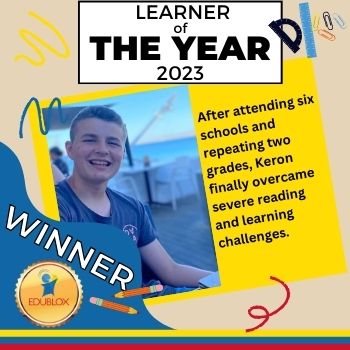“Protect your child’s self-esteem at all costs and be their number one supporter,” advises Pam, Keron’s mom.
Keron was diagnosed with ADHD.
Severe dyslexia made school difficult for Keron, who attended six schools and repeated two grades.
After Edublox was discovered, Keron learned to read and work independently.
Keron and his mom celebrate his success at the end of a long journey.
Keron tells his story:
.
Keron’s mom tells their story:
Keron has been an exceptional child from birth. From the day he was born, I felt he deserved the absolute best life we could give him. He was a gift to us after a terrible loss, a gift that I treasure with all my heart. He is extremely kind, empathetic, always positive, happy, and loves to help and please others.
It was evident from the first day he started pre-primary school that he did not fit “the box.” Our journey and fight to educate him in a way that was best for him started from the very first week of school, and what a journey it has been!
Struggling at school
I recall the first time a teacher called me to discuss Keron’s progress. He was in Grade 0, about four years old. She told me that my child was extremely disruptive and naughty, and that they were very concerned as he would not sit and do his “work,” could not write his name, or count to ten. I was given the name of a behavioural therapist and advised that I needed to put Keron into behavioural therapy as a matter of extreme urgency.
I politely declined the referral. I knew my child and that he was definitely not a “naughty boy.” Different, maybe, but not naughty. I was not naive to the fact that he could not remember the days of the week, count to ten, or write his name like the other kids. But I also knew he was intelligent, extremely creative, had a great imagination, and enormous potential.
Finding the right box
I did some research, and as we have dyslexia and ADHD in our family, I highly suspected that his brain may work in this way, too.
I contacted a specialist paediatric neurologist, only to discover that the waiting list for an appointment was about five months long. At this time, I was being pressured by the school to take him to my GP and get him on medication. To me, it seemed that’s all they wanted (to make him easier to have in the class), but I wanted someone who really understood neurodiverse children to work with Keron.
Eventually, we met with her, and it was very evident that he did have ADHD, and the best for him would be to go on medication to help him learn. It was confirmed that he was not defiant or naughty and that there was nothing wrong with his behaviour. He is just wired differently and would need understanding, extra breaks, and medication. I thought, great – it’s all sorted!
We took Keron out of the pre-primary school not long after he was diagnosed with ADHD. This was the first of many schools that did not fit him.
I will always be grateful to Dr Schlegel for giving me the mindset of not having to make Keron fit into the box but instead finding a box that would fit him or, even better, finding some way for him not to fit into any box.
The difficult journey continues
By the time we finally came across Edublox and EASY, we had been through six schools.
It was evident in Keron’s first year of Grade 1 that ADHD would not be his only challenge. He was also not grasping reading and other skills like his peers. The school tried its best and offered many in-house therapies, and Keron spent most of his day doing all of them (Occupational Therapy, Speech Therapy, NILD – these are the ones I can remember; there were so many).
It was not a sustainable or good situation for Keron’s self-esteem. He wanted to be like his classmates, and he couldn’t understand why he was not doing the same things they were doing and why he was always out of the class.
We looked at what was available through state schooling and considered private remedial options. To my surprise, there were not many options. If we went the state school route, there were all kinds of things that had to happen and hoops to jump through before they would consider him for remedial schooling. I can’t recall all of the conditions, but I recall that he would have to have repeated a grade at least once before they would even consider it. It would take at least two years before he would be offered an alternative – if at all. We really felt like we didn’t have much of a choice.
Would a dyslexia diagnosis make a difference?
We eventually settled on a small private remedial school. My gut told me it wasn’t the right option, but there didn’t seem to be a better option. Keron repeated Grade 1 there, and it seemed to be going okay, but then suddenly, in the third term of Grade 2, we were told that we needed to have Keron diagnosed with dyslexia. We would need to bring them the report. Otherwise, Keron would not pass the year and must repeat a second time.
I asked questions: What happens when I bring the report showing he is dyslexic? What are you going to do? How are we going to help him?
The answer was “nothing much,” but it would mean that they could pass him due to concessions.
We took Keron out of the school about two weeks later. We felt that the plan for Keron going ahead would simply be a box-ticking exercise. I could see that he wouldn’t be given what he needed: an action plan, not a piece of paper.
Keron loved the friends he had made there. I had to try to explain to him why he was changing schools and why I was taking him away from his friends again. We were all so disappointed as we had hoped for more, especially from a remedial school.
He still could not read!
After that, Keron went to a cottage school for a year and did NILD a few times a week. Lots of promises were made, and he had a lovely-looking report at the end of each term, but I saw no progress in what we felt was important: HE STILL COULD NOT READ AT ALL!
School number six can be described as a tutoring centre. As you can imagine, this was not cheap, but we were willing to sacrifice – to do and try anything for Keron if it meant he would learn to read. We were desperate.
Keron repeated Grade 3 and spent about a year and a half at the tutoring centre. Again, many promises were made. Again, he had a lovely-looking report with 7s all over the place but could still not read or write any word longer than three letters. They kept telling me, “He’s intelligent. He’s doing so well. You don’t have to worry about him. He’s fine.”
Demanding help
I kept pushing back. What was the point of getting 7s for subjects like natural science and history if he couldn’t read a single sentence? By now, Keron was about 12 years old and had repeated two grades. I was beside myself with worry.
I scoured the internet looking for reading programs – anything! I kept finding the same things: online reading programs (which we had tried), Speech Therapy, etc. I felt hopeless.
I would go to sleep full of worry, night after night, thinking, How will my child make a living one day? How will he support himself? Keron would not even try to read. I would encourage him to read at every opportunity I got, like a slogan on a truck driving past or a food label. But he would shy away from it and wouldn’t even try, no matter what I did or how much I wanted to reward him for trying.
At school, his tutors were reading and writing everything for him. I kept on sharing my worries with his teachers. I eventually demanded a plan, and they said: “Okay, maybe you can try Edublox.”
A new school – for the 7th time*
An evaluation at Edublox concluded that Keron was way behind his grade level in reading and writing. The recommendation was that he attend Edublox full-time and do the EASY program.
It took a bit of convincing as this would be Keron’s seventh move. I owed it to him not to make another mistake. Moving him again would mean taking him away from his friends again.
I talked to Keron, and it’s a conversation I will never forget. I explained things to him, and I was sincere. He cried (which broke my heart), but he was so kind and mature, and he told me that he knew I knew what was best for him and that he trusted me. We agreed to give it two years and that whatever happened, we would stick it out for two years.
Relieved from stress
Being his friendly, happy self, Keron made friends within just about the first day.
The immediate difference I felt was relief from the stress of him studying for tests and exams. Keron could not read well enough to be able to study, so I would have to read every word to him. I had to study everything alongside him.
It was a major relief to be given key information to study for tests and exams, and the testing was far less frequent. I also felt less importance was placed on his grades for the content subjects. They did the work, and we studied, and he still got reasonably good grades, but the stress around this seemed reduced.
I was happy to see this as I agreed with their thinking – the focus was on more important things like reading, writing, and maths.
His first year went reasonably well, and Keron was pleased.
A glimmer of (reading) hope
About halfway through his second year at Edublox, I noticed he was not shying away from reading at every opportunity anymore like he used to. Now, when I asked him to read slogans on trucks and adverts, he would try and many times, he could.
I felt a glimmer of hope that he would learn to read, and I was starting to feel a little excited. He was doing more and more work on his own. While I was still doing all his studying and homework with him, I would push him to try a page or read a question himself. Slowly but surely, he started to do some things independently. His Edublox assessments were also showing good progress in reading.
This is Keron’s third year with Edublox. He is in Grade 7. The first two terms went reasonably well, and he continued to progress with his reading.
I noticed he was asking me to read gaming instructions to him less and less until I noticed he had completely stopped asking me to read things to him. I also noticed that he was starting to take it upon himself to do his homework independently. I began to leave him at home and go and do what I needed to do, and he was coping alone. In the second term, when we were studying, I would tell him to read a paragraph, and he could read at least 80% of it.
Studying and learning independently, at last
When the Term 3 assessments came around, I could see how much his reading had progressed. I decided that I would try to let him study alone and just recap with him. I was nervous to do this, but I thought: What is the worst that can happen? His grades could drop, but it would not be the end of the world.
I nervously recapped with him the day before he wrote his first assessment. I could see that he knew his work well. I was so excited. Could he do this?
I was so nervous when I picked him up from school after the first assessment. He jumped in the car, and I asked him how it went. He answered, “Great!” I thought, Gosh, it worked!
And so we went through the rest of the assessments in a similar manner, and each time, I would ask him how it went, and he would answer, “Great!”
Report day was approaching, and I was getting more nervous. I fetched him. He jumped in the car and gave me the report. I nervously opened it and found that he did better in most subjects than in Term 2!
I don’t think I could ever be prouder of him than I was when he gave me that report. I was so happy and relieved. Finally, finally, it was proven: HE COULD DO IT! He could read well enough to learn his work and to work independently. I was also so proud of Keron for trusting in himself and believing he could. Best of all, he was proud of himself.
Grateful for Edublox
I wish I had known of Edublox when I first looked at alternatives at the beginning of Keron’s school career. It would have saved so much heartache and worry. Yes, Keron doesn’t read as well as other Grade 7 learners yet, but he reads well enough to get by now, and I know he will continue to improve.
I have found that the teachers at Edublox Durbanville understand dyslexia and ADHD way better than most. He was pushed when he needed to be pushed. They eased off when it was needed. Compassion and love were shown to him. For this, I will be eternally grateful!
My advice to parents
Always be on your child’s side. We, as parents, must be their number one supporter.
Protect their self-esteem at all costs; having strong self-esteem is vital for their future. They are just as worthy as neurotypical children. I have seen firsthand what learning differences can do to self-esteem. It can be devasting; it’s dangerous.
Never give up on them and feel guilty about pushing for more. If it doesn’t feel right, it’s not right.
Act, and don’t be scared to question things. Trust that you know your child best. Let them and others know you love them just as they are while supporting them to be their best.
I never want to change who Keron is. His struggles and differences make him who he is; they will be his strengths someday. He is unique, and that is something to celebrate. And he CAN READ!
All will be okay. There is potential for greatness in Keron’s future – and in your child’s future, too.
Pam Oliaro
* Edublox Durbanville is a registered school.






